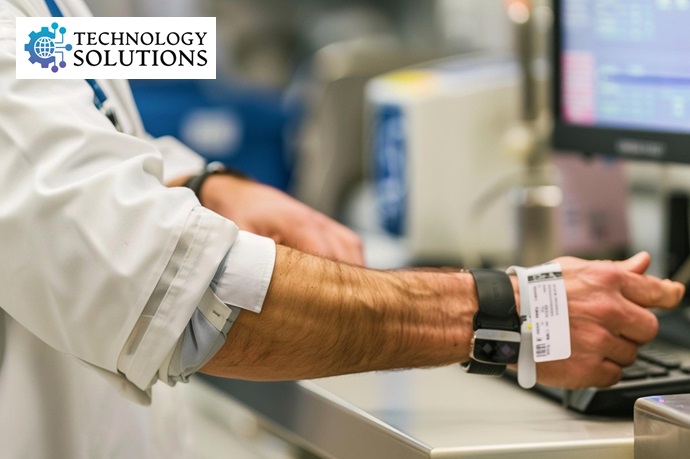In the rapidly evolving world of healthcare, technology plays a pivotal role in improving patient care and operational efficiency. One technology that has been making significant strides is Radio Frequency Identification (RFID). RFID solutions are transforming the healthcare industry by enhancing asset management, patient safety, and overall efficiency. In this blog post, we’ll explore the key benefits of RFID solutions for the healthcare industry and how they can revolutionize healthcare operations.
What is RFID Technology?
RFID stands for Radio Frequency Identification, a technology that uses radio waves to transmit data between a reader and a tag attached to an object. In healthcare, RFID tags are commonly used to track and manage medical assets, patient information, and inventory. These tags come in various forms, including passive (which require an external power source) and active (which have an internal power source).
Benefits of RFID Solutions in Healthcare Industry
RFID solutions offer numerous benefits for the healthcare industry, including enhanced asset management, improved patient safety, and streamlined inventory management. By providing real-time tracking and accurate data, RFID technology helps healthcare facilities manage medical equipment efficiently, reduce the risk of errors, and optimize inventory levels. This leads to better patient care, reduced operational costs, and increased overall efficiency. With RFID, healthcare providers can ensure that resources are used effectively, patients receive the right treatments, and critical assets are always available when needed.
1. Enhanced Asset Management
One of the most significant benefits of RFID solutions in healthcare is improved asset management. Hospitals and clinics often have a vast inventory of medical equipment, from wheelchairs and infusion pumps to surgical instruments. Tracking these assets manually can be time-consuming and prone to errors. RFID technology streamlines this process by providing real-time visibility into the location and status of each item.
With RFID, healthcare providers can:
- Reduce Equipment Loss: RFID tags help in locating misplaced or stolen equipment quickly, reducing the financial impact of lost assets.
- Optimize Utilization: By tracking equipment usage, hospitals can ensure that resources are allocated efficiently, preventing overuse or underuse of critical assets.
- Minimize Downtime: Real-time tracking helps in scheduling maintenance and repairs, thus reducing equipment downtime and ensuring that essential devices are always operational.
2. Improved Patient Safety
Patient safety is paramount in healthcare, and RFID technology significantly contributes to enhancing it. Here’s how:
- Accurate Patient Identification: RFID wristbands with unique patient identifiers ensure that the right patient receives the correct treatment, reducing the risk of medical errors. This is crucial for preventing mistakes such as administering incorrect medications or performing procedures on the wrong patient.
- Track Patient Movements: RFID can monitor patient movements within a facility, ensuring that patients are in the right place at the right time and helping staff quickly locate patients in case of emergencies.
- Medication Management: RFID solutions help in tracking medications from the pharmacy to the patient’s bedside, ensuring accurate dosing and preventing medication errors.
3. Streamlined Inventory Management
Managing medical inventory efficiently is critical for maintaining the availability of essential supplies while minimizing waste. RFID solutions provide several advantages in inventory management:
- Real-Time Stock Levels: RFID systems offer real-time data on inventory levels, helping healthcare facilities maintain optimal stock levels and avoid shortages or overstock situations.
- Automatic Replenishment: Integration with inventory management systems allows for automatic reordering of supplies when stock levels fall below a predetermined threshold.
- Expiration Tracking: RFID tags can store expiration dates, ensuring that outdated products are identified and removed from inventory before they reach patients.
4. Increased Operational Efficiency
Operational efficiency is a key factor in delivering high-quality healthcare. RFID technology contributes to this in various ways:
- Faster Check-In and Check-Out: RFID-enabled systems streamline the check-in and check-out processes for patients and equipment, reducing wait times and improving overall patient flow.
- Efficient Staff Workflow: RFID solutions can automate various administrative tasks, such as tracking staff movements and ensuring that the right personnel are assigned to specific tasks, which helps in optimizing workflow and reducing administrative burden.
- Data Accuracy and Reporting: RFID systems provide accurate and reliable data, enabling healthcare providers to generate comprehensive reports on equipment usage, patient interactions, and inventory levels. This data-driven approach supports better decision-making and continuous improvement.
5. Enhanced Compliance and Reporting
Healthcare facilities must adhere to various regulations and standards, such as those related to patient safety and equipment maintenance. RFID solutions help ensure compliance by:
- Automated Documentation: RFID systems automatically record data related to equipment usage, patient interactions, and inventory transactions, making it easier to maintain accurate records and comply with regulatory requirements.
- Audit Trails: RFID technology provides detailed audit trails that can be used to verify compliance and investigate any discrepancies or issues that may arise.
Conclusion
RFID solutions are revolutionizing the healthcare industry by providing numerous benefits that enhance asset management, patient safety, inventory management, operational efficiency, and compliance. By implementing RFID technology, healthcare providers can improve the quality of care, reduce costs, and streamline operations. As the healthcare industry continues to embrace technological advancements, RFID solutions will play an increasingly vital role in shaping the future of patient care and facility management.
If you’re considering RFID solutions for your healthcare facility, it’s essential to partner with a provider that offers tailored solutions to meet your specific needs and challenges. Embrace the power of RFID and unlock the full potential of technology in transforming your healthcare operations.

